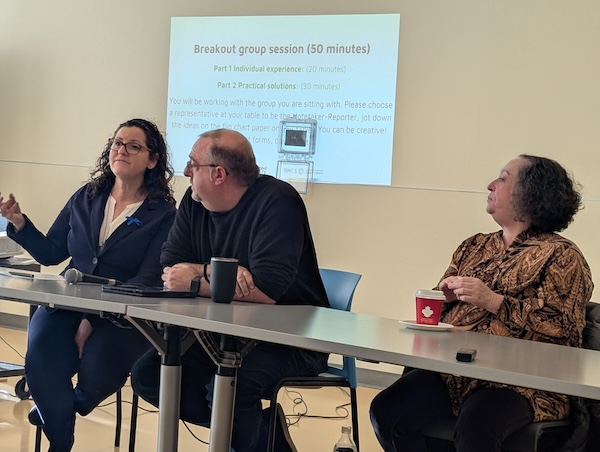Rabbi Susan Tendler, left, Lonnie Belfer and Lynne Fader were panelists at a dialogue on antisemitism in Richmond Jan. 26. (photo by Pat Johnson)
Communities need to be more proactive and less reactive toward antisemitism – to focus less on what to do after an anti-Jewish hate crime occurs and to prevent them from happening in the first place.
That was one of the recommendations at a meeting on antisemitism convened by Richmond Multicultural Community Services Jan. 26. Panelists were Rabbi Susan Tendler of Beth Tikvah Congregation, Lynne Fader, co-executive director of the Kehila Society of Richmond, and Lonnie Belfer, a program manager in skills training for employment programs, experience and disability support services.
Panelists and participants noted that expressions of concern by officials in the community are not always backed up by actions.
“In the days in particular after Oct. 7, it meant a lot to many of us that the RCMP was there,” said Tendler. However, during one instance when police were called, the response time proved not as immediate as the police had assured the congregation it would be.
Likewise, legislation and other steps “look really great on paper,” she said. The City of Richmond adopted the International Holocaust Remembrance Alliance Working Definition of Antisemitism and the provincial government is making Holocaust education mandatory in secondary schools across the province. But these are not silver bullets to the problem, she said.
“In the four-and-a-half years that I’ve lived here, I’ve noticed a change that’s scary to see,” said Tendler.
She tells clergy from other religions that Jewish congregations pay for private security and they acknowledge that such an expenditure would gut some of their budgets.
“The province has tried to offer some more grants and make them accessible to ensure that we all do feel safe but, again, it’s a shame that that’s the situation in which we all live,” she said.
Fader’s father was a cab driver in East Vancouver and taught his kids to “never roll over and never stay quiet,” she said.
She recalled minor and more significant incidents of antisemitism across her career and was critical of elected officials who are visible for PR opportunities but absent when substantive action is needed.
“I do hold our politicians accountable because in my opinion they’ve done nothing and they’ve allowed hatred in all our communities to grow because they are more worried about photo opportunities,” she said.
Fader endorses restorative justice, which was the approach taken when some young people were caught after spray-painting swastikas on Beth Tikvah’s building. The perpetrators were brought to meet a family in the congregation and to hear the family’s Holocaust survival experiences.
“There are huge systemic issues, not just in Richmond, not just in BC, not just in Canada, but globally, on antisemitism, racism and all the rest,” Belfer said. “That needs to be addressed.”
However, he is hopeful.
“There are issues, but there are wonderful people in this community who are doing wonderful things,” he said. “It’s unfortunate when I look around the room that I see so few non-Jewish people in the room because we know the problem. We face the antisemitism.”
Breakout groups developed tangible steps the community could take to address antisemitism and enhance multicultural well-being. These included having the City of Richmond hold a multicultural day at which cultural communities provide food and entertainment, and taking the show on the road, bringing cultural communities out of their own congregations and community centres and meeting in less familiar territory.
Community-building grants are available from the city, said one participant, “but there are too many hoops to jump through to get them.”
Doors Open Richmond is an annual program where religious and cultural groups welcome non-members to their facilities, but participants said Jewish institutions are challenged both by the fact that the event takes place on Saturdays as well as Sundays, and because security concerns largely preclude Jewish participation.
One participant stressed that approaches to antisemitism are generally reactive.
“You’ve had hate speech thrown at you, what do you do?” he asked. “The question isn’t what do you do after, it’s how do you prevent it from happening? There needs to be more forward motion in how to stop it from occurring versus what you do after you’ve been beaten up on the street.”
Alan Hill, inclusion coordinator at Richmond Multicultural Community Services, facilitated the event, which took place at City Centre Community Centre. He explained that the panel was part of a larger series funded by Heritage Canada to build bridges and connections. Other events have focused on Indigenous leaders, Ukrainian refugee groups, youth groups, the Filipino community, Islamophobia, gender perspectives, the experiences of women, and a Black History Month event. A symposium on anti-Asian hate is coming up. In March, all groups will come together to review experiences and consider next steps.

